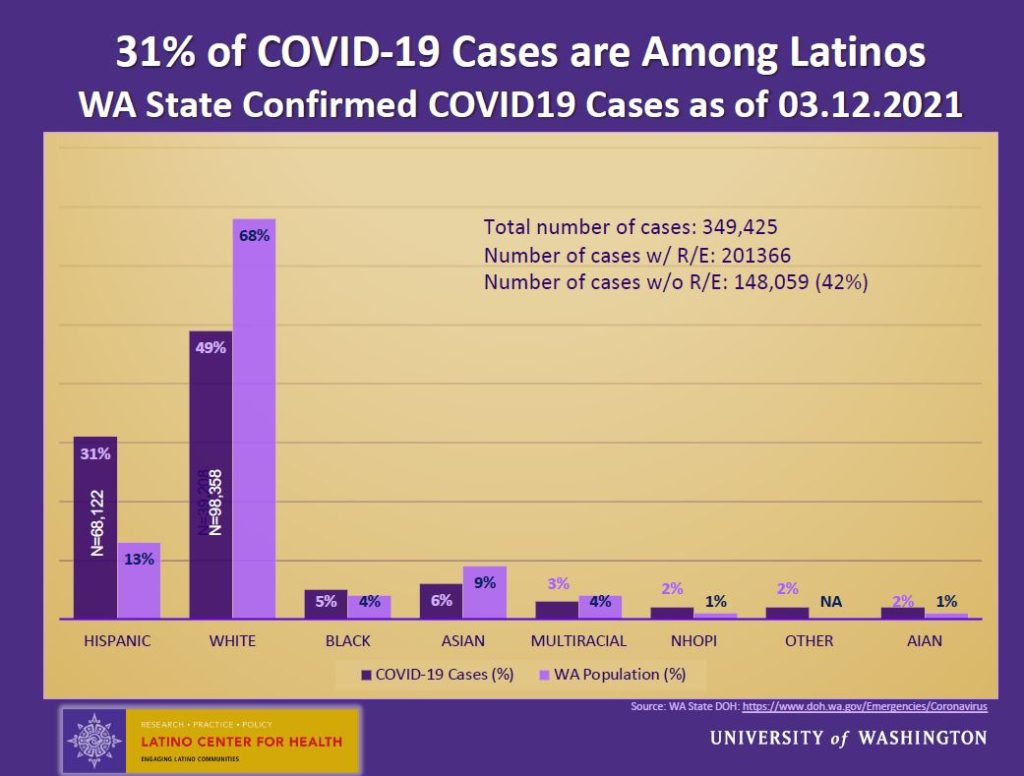The UW Population Health Initiative just announced the awarded projects of its 2021 pilot research grant program, one of which was the Bi-directional Research Digital Engagement (BRIDGE) project whose Principal Investigator is Dr. Nathalia Jimenez, Research Director of the Latino Center for Health.
BRIDGE is a new partnership between the Latino Center for Health, the UW Department of Communications’ Center for Communication Difference and Equity (CCDE), UW School of Medicine’s Latinx Health Pathway (LHP) and the Mexican Consulate.
BRIDGE aims to highlight community voices to address current COVID-19 needs and create a sustainable platform for future communication around Latinx health.
You can read more about the project in the abstract below. Congratulations, Nathalia and team!
Project abstract
Responding to the need for sustainable academic-community partnerships to address the burden of COVID-19 in Washington State Latinx communities, we propose developing an innovative bi-cultural, Bi-directional Research Digital Engagement (BRIDGE) Program.
BRIDGE is a new partnership between the Latino Center for Health, the UW Department of Communications’ Center for Communication Difference and Equity (CCDE), UW School of Medicine’s Latinx Health Pathway (LHP) and the Mexican Consulate. BRIDGE aims to highlight community voices to address current COVID-19 needs and create a sustainable platform for future communication around Latinx health.
BRIDGE’s innovative approach leverages infrastructure from the Mexican consulate (Spanish radio programing and Facebook reach 20,000+ followers) and an interdisciplinary network of faculty in LHP, combined with CCDE’s storytelling experience, to create an interactive platform for in-time communication with Latinx communities.
Based on findings from LCH’s collaborative work around COVID-19 with the Washington Immigrant Solidarity Network and SeaMar Community Health Centers, and input from our community partner, the Mexican Consulate, BRIDGE proposes a stepwise pilot program that captures community needs through personal stories to understand gaps in care, education and outreach related to COVID-19 (e.g., mental health, school needs for Latinx children). It responds to outlined needs with in-time, culturally appropriate educational content (e.g., vaccinations) from bicultural/bilingual faculty and students to be disseminated through the Mexican Consulate’s outreach network.
Pilot data will inform future COVID-19 research efforts and a grant submission on the evaluation of social media as a tool for disseminating culturally appropriate health information to Latinx immigrant communities.
Investigators
Nathalia Jimenez, Department of Anesthesiology & Pain Medicine
Carmen Gonzalez, Department of Communication
Daniel Cabrera, Department of Medicine
Diana Maria Oliveros, Mexican Consulate in Seattle
Meg Gomez, School of Social Work
Aida Hidalgo, School of Public Health
Mikaela Freundlich Zubiaga, UW Latino Center for Health
